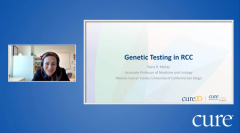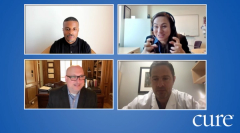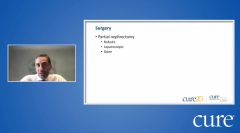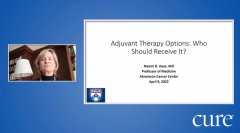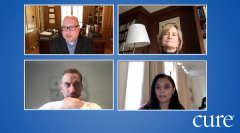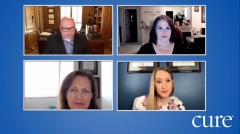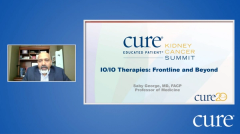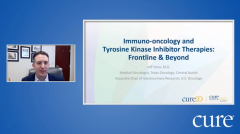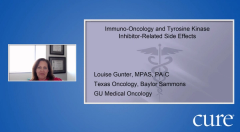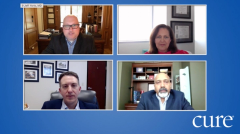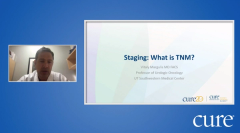
Educated Patient® Kidney Cancer Summit Diagnosis Panel: April 9, 2022
Watch Dr. Vitaly Margulis, Dr. Rana Mckay and Kwame Garrett-Price answer questions about kidney cancer diagnoses during the CURE Educated Patient Kidney Cancer Summit.
Episodes in this series

This panel featured Dr. Thomas Hutson, Dr. Vitaly Margulis, Dr. Rana Mckay and Kwame Garrett-Price.
Hutson: Kwame can you tell us about your journey?
Garrett-Price: In February 2019, I was having the worst headache I ever had, didn't know what it was, didn't know what was going on. And I passed out completely and thankfully I was in the presence of family and was rushed to Baylor Scott & White in Dallas, Texas, where I had an emergency craniotomy and no one knew what it was. And the biopsy results came back. And turns out it was von Hippel Lindau (disease).
And from that point on, we put together a team, you know, endocrinologist, obviously, PCP neurosurgeon, urologist because of the RCC, and we also did more testing. And at that point, we found RCC, and that was October 2019. That same year also had a partial adrenalectomy performed at Baylor Scott & White. So, the most important part of it was figuring out what to do, where to look, and where to, you know, find the specialists, because these tumors manifest themselves throughout different organs in the body, brain and eyes, kidney, pancreas. And, yeah, that's been my journey with it thus far.
Hutson: Thank you for sharing that. And if you had one statement to make to others, our patients and families, what would that be? Would it be to find expert care? Or what did you find to be the most useful for you with the support groups like the VHL Alliance? What advice would you give?
Garrett-Price: Support groups help as well, the VHL alliance has been phenomenal. You know, they're the world's leading organization, when it comes to, you know, von Hippel Lindau, and clinical care, and research and education. But one thing that's helped me so much, I created this flow of information between myself and my physician. And that's really kept me alive. You know, that's how we got the CT that found the RCC. And that's what's given me the best care because my visits are high-yield now, because they're kept in the know, for instance, my endocrinologist, I send her my blood pressure readings every 45 to 60 days. And she's such a wizard, Dr. Raffia Valera, here in Dallas. And, you know, she takes this data, it's just the fact that she has it. You know, as I said, it allowed my visits to always be high yield. So when I go in, it's boom, boom, boom, we can get straight to the point, you know, what's going on, we don't have to spend the first five minutes catching up on everything. And, you know, over the past, however many months since our last visit, so I would say, you know, you have to advocate for yourself, you have to be ready, you have to be knowledgeable, and you can't come in clueless, don't be scared to have notes, don't be scared to be able to move forward in that way and speak up for yourself. Because, you know, I know I'm on a panel full of physicians, but depending on what's happening, you know, a physician can come in the room, and they're out before you know, and you don't know anything. So make sure you're ready. That's what I would say that's how you get the highest yield results in the highest yield care.
Hutson: Well, that's amazing. And thank you for sharing your story. We've got several questions that have come in here. So let me just start giving them out. So any of the people on the panel can certainly jump in, but this this first one is going to Vitaly’s talk on TNM. And the question is what does TNM stand for?
Margulis: Tumor, node, metastases and so I remember when I discussed the three components of the system, the TNM system, one has to do with the extent of the tumor in a site of origin, ie the kidney, how advanced or how extensive the tumor is, the N stands for has the cancer spread to any other regional lymphatic, there enlarged lymph nodes around the tumor, and the M stands for metastases as the cancer has spread to the other parts of the body. So that's in a nutshell.
Hutson: Perfect. And then I guess a follow up in there was once diagnosed, when is stage and predicted model established?
Margulis: It's a good question. And there are two opportunities to do that. You know, the general scenario is that the patient, we see a patient and then there is a mass that's discovered in the kidney. And we can get clinical staging, ie, staging based on X rays, CAT scans, etc. We haven't removed the tumor, we haven't treated the tumor. You can get a clinical stage based on the tumor size. Do we see any signs of the tumor spread? Was there any signs of the spread to the regional lymph nodes etc so we can get clinical stage aside. And the second opportunity to stage, and it's probably more accurate staging, is when we actually remove the primary tumor with surgery. We can look at the tumor we can get an exact understanding, has the tumor spread beyond the confines of the kidney as its invaded into the surrounding structures looking down at what's called the pathologic stage, the stage based on the battle logic evaluation, it's probably a little bit more accurate. So yeah, so those will be the usually the two times when we get appropriate staging done.
Hutson: And I guess this next question could be really as a kind of a in the gray between Dr. McKay’s and Dr. Margulis’s presentations, but is there an imaging or blood test that can determine if someone still has, what the questioner is calling, cancer stem cells once the tumor has or has already disappeared? Is there any way to use cancer stem cells or blood test to follow?
McKay: We certainly talked about that. I think there are blood tests that are being developed to detect what we call minimal residual disease after somebody has had their cancer resected and we think that they're in remission. I tell my patients remission plus time equals cure for those patients with localized disease. But during that period of remission, there are blood tests that are being developed to detect MRD. None of them have been, you know, clinically available for patients with RCC. There are certain tests that are done in colorectal cancer that are commercially available. The application of those tests in RCC has been a little bit more challenging, really given the nature of the kind of tumor that RCC tends to be. So though there's a lot of research that's being done into the identification of MRD tests for kidney cancer, but none that are available in primetime.
And just to kind of step back, I think just to comment on that first question that was, you know, provided to Kwame, whenever I approach kidney cancer, I think the three key questions that are always critically important to try to get answered for any given patient is what is it? Where is it? What are we going to do about it? So the first question of what is it really refers to what's the histology? What does the biopsy show? Is it a clear cell? Is it a non-clear cell? What are the genetics of the tumor? The second question is, where is it? And that gets to be your stage. What stage of cancer do you have? Is it localized or has spread? You know, where is it? Do I need additional imaging to figure out where the tumor is? Have I gotten all the right imaging? The last question is, what do we do about it? We can't really answer the last question until we know the answers to the first two questions. We get to the last question. I usually break it down into, okay, I see the tumor, do I need to do something to things that I see what are the focal or local therapy options? And then the second part of the what do I do question is do I need anything in my system? Do I need systemic therapy, something that would be taken orally or IV from the tumor? And I think if you can put that in a framework so that when you're coming in to see your doctor or somebody has a new diagnosis, those are always the three questions that I asked at any treatment decision change. That's okay. What is it? Where is it? What are we going to do about do we know what it is and reconfirmed it's kidney cancer? Where is it? I need imaging? What do I do?
Hutson: Excellent. And then, I guess following up on this, this would be for Kwame. You know, what ties into the VHL disease? You know what you mentioned Rana was that one of the big, scientific advances from the 1990s. I remember a science publication from 1993, talking about the discovery of the VHL gene, which you said was on the short arm of chromosome three, and then the tie into the development of the VHL syndrome, and then, which was more of a germline hereditary kind of syndrome. But the question here is, well, if that's the case, then how can this happen somatically? Why is VHL an issue?
McKay: No, very good question. I mean, there's a lot of things that can cause alterations in genes that can predispose somebody to cancer as we talked about, like, somebody could just be born with it. They're born with a genetic alteration, or environmental factors, various things play in sometimes we don't really know the cause most of the time, we don't know the cause. That can cause a mutation in the gene.
VHL is very important because this VHL regulates a certain protein called HIF. And VHL helps get rid of HIF when it's not supposed to be there and helps let it be there when it's supposed to be there. But if VHL helps kind of degrade this, it's not necessarily a bad protein, but it can. When things are normal, it really shouldn't be hanging around. And so HIF helps get rid of it. But when when VHL is gone, this protein just builds up in the cell and can cause all this badness and actually studying VHL syndromes from families of individuals that have this disease that has really catapulted us in developing all of these drugs for kidney cancer, the reason that we have (Sutent [sunitinib]), pazopanib, (Welireg [belzutifan]), all of these drugs that actually ended up winning a Nobel Prize in Medicine in 2019, is because of studying and understanding the pathogenesis of kidney cancer in patients with VHL syndrome.
Hutson: Absolutely, I often will tell my patients, sometimes we just don't know it's a cosmic ray. There's certainly risk factors and things smoking and obesity. Now there's stuff but we really don't know. And I remember back during the development of one of the drugs from the original group, it was pazopanib, we looked at our original phase 2 study of that drug. And we tried to determine could we detect these types of mutations and somatically. And using modern technology of the time, we could find some type of loss of function heterozygosity of the gene function or something that from the VHL gene that was that was in 97% or so of patients. And so I suspect that that some type of abnormality and function of VHL is the requirement to get clear cell RCC at some level and whether we can identify 99.999% of the null but we can certainly identify 97% of them using the technology of 2008. So, yes, it happens for reasons we don't know. So thank you.
And then we've got one another one that maybe anyone could take but I think Rana may be for you is I have several family members who have melanoma and I have RCC. I read that there might be a genetic similarity between the two cancers is this true?
McKay: Not necessarily a direct link, but I would probably say for people who have a strong family history. So when I think about, you know, a lot of melanoma in the family, you always have to factor in hereditary factors, but also lifestyle factors. So, you know, fair skin, where do y'all live? Like, you know, so there's a lot of things that come into play, because a lot of times the things that link us on a hereditary level, there's things that link us at an environmental level, like you're in the same environment, eating the same foods doing the same thing. But nonetheless, I think there are clear guidelines for who with RCC needs to get genetic testing. I think if there's any concern, definitely talk to your clinician, your provider about that. It's actually very easy to do genetic testing, we do it in our clinic all the time. We talk about it, we understand the results and the implications. And it's a simple blood test or a simple saliva swab. And then you get the test results back in, you know, two weeks, and I think the field is really moving into integrating this more into clinical practice. So I would definitely say talk to your clinician.
Hutson: And as a follow up to that. Another question was my family has been identified by the NIH as susceptible to kidney cancer (mother, mother's brothers and sister) but not because of any identified genetic mutation. One family member has a VUS. What should our surveillance plan be for the family members?
McKay: So, like I said, generally you don't need to do anything about them. For most it is not the reason. Their VUS is more because we just don't know. But based off of all the data that we have, thus far, they have not been identified to be pathogenic, that pathogenic but we just haven't investigated that specific mutation in that specific gene. So we really don't 100% know. So there's this kind of gray line of saying, okay, 95% of these are going to get reclassified as benign, but 5% may in the future, like five to 10 years from now we learn more about these conditions and they may get reclassified. Generally, there is no surveillance monitoring for somebody that has a VUS or no reason to do genetic testing for family members for somebody with VUS but talk to your provider, talk to your clinician and talk to a genetic counselor about it.
Hutson: That sounds great. And I remember what I use as just as a rule of thumb is that patients you know, younger than age 50 with kidney cancer should be set for genetic testing, for sure. And sometimes that is an older person, but they you knew that they had the tumor for quite a while. The median age of diagnosis of this cancer is 63 to 65. So that certainly seems appropriate. But anytime someone requests for genetic testing, I certainly will send them.
This is a good question for Vitaly. But I'm sure Rana knows the answer to but how long can a cell sample be stored, and still be able to provide pertinent genetic information?
Margulis: If the tumor is frozen appropriately, it can be essentially frozen indefinitely. So for germline testing, that tissue can be for somatic testing, that tissue can be essentially refrozen and assayed, especially for DNA, which is stable, you know, years and years afterwards. So it's all about proper storage and proper tissue handling, by the by the clinicians.
McKay: Yeah, I would agree. I mean, most of the time, most of these tests can actually be done on what we call the paraffin embedded block. So after Dr. Mercola does his surgery, a lot of times they'll put the specimen on wax and store it in pathology for a pretty long time. And we can actually do a lot with that paraffin embedded block that's basically sitting on wax.
Hutson: Excellent. And if we go back, Vitaly to your first slide, you had some statistics, I guess outcome survival statistics or whatnot in, in the question opposed is, is that before or after immunotherapy became a common treatment approach?
Margulis: I think my slide was very general. And I just talked a little bit about the incidence or number of new cases and a number of cases that progress after treatment. So when we take the tumor out, when we take the kidney out roughly, about 30% of the patients, if you take all comers will progress, or will cancer come back, that does not factor the latest sort of emergence of immunotherapy that's given an adjuvant or preventative space. So we'll have to see a little bit how that will, you know, affect the recurrence rates, especially in more advanced tumors. But roughly the rule of thumb, you know, out of 100 patients that I treat for kidney cancer, assuming some have more advanced disease, some less advanced disease, about 30%, at some point at five years, will have some degree of recurrence.
Hutson: Great, thank you. And then, Kwame, do you have any advice on how to have the talk with your family about a genetic cancer?
Garret-Price: Yes, so within my family, within four months, of me doing my own genetic testing, half of my immediate family had done it, and the other half had a little anxiety about it. But I find that if you can reach the matriarch of the family, oftentimes, the drivers or the decisions for everything, they're setting the appointments for everybody. So if she understands the importance of it, then I think that's a win for getting genetic test, and then you make it a family thing, making it a bit, you know, make sure everyone can do it together, or, you know, around the same time, so those who are anxious, you know, they're a little bit less apprehensive, because, you know, understanding your health profile is a huge advantage. You know, there I say competitive advantage, and just navigating this world and being healthy and being able to function day to day. And to be quite frank, it was one of the coolest things I've ever done sitting down with my genetic counselor, and she's going through everything and, and just, I don't know, it's an awesome thing. So I think communicating that as well, the same way you do a family tree, you know, in another way for another reason, you know, you're doing a similar thing. You know, with this, we jump up, we do family trees, instantly. And, you know, with this, I feel, if you can just break down, that it's a great thing. It's a cool thing. And you can reach the key decision maker, you're good and makes the conversation a lot easier to have.
Hutson: Thank you for that. That's very insightful. The next couple of questions have to do again with kind of genetics and prognosis. So there's a question: Is there any research around prognosis and or therapies for NF2 mutation in non-clear cell unclassified?
McKay: I think there is research that is being done. There's nothing that's sort of close to entering into the limelight. I mean, we don't have a target, a drug that can specifically target that gene. I think with regards to understanding its prognosis and RCC, it hasn't historically stood out as sort of a big hitter, with regards to really swaying how people do one way or another. But certainly, I think we need to learn and understand these genes more and how to better target them when we think that they could be drivers of the cancer.
Hutson: Yeah, absolutely. That's an area ripe for ongoing research here. This last question, I think could be maybe handled by all three panelists. And there's really two parts to it. One is if it's if suspected genetic and they put in 5%. RCC, is it wise to be with a teaching academic hospital? It's one important question. And then how do you determine the appropriateness of your doctors and team? How are you able to assess whether you're at the right place?
McKay: I think maybe we're biased. I mean, I think, for me, for somebody who has a cancer, I think, wherever you are, trying to find an NCI-designated cancer center is probably a good thing. If for the minimum of just getting a second opinion, to make sure that you're on the right path, and you're getting, you know, the right treatment. And hopefully, there is, you know, I think, consistency in messaging across all your doctors regarding what's the right strategy, I think second opinions can be helpful in doing that. I think for people with hereditary syndromes that have a complex disease, honestly, they are best managed and best treated at an NCI designated cancer center or center where they truly have a multidisciplinary team that can assess all of the different components for that given syndrome. You know, it's not just medical oncology, it's not just urology, it's actually the whole gamut neurosurgery, ophthalmology. So pulmonary, depending on where the disease is neurology, so making sure that there's a system of specialists and that those, it's not just having the specialists, it's that the specialists actually talk to one another is an important thing.
Garret-Price: I found the research institutions to be the most thorough, the most comprehensive. I enjoy my visits at UT Southwestern, and no patient says they enjoy their visits. But, you know, I do find it to be very thorough, like a little symposium, you know, during the visit. So I, there's a balance in the way I found my care team. Luckily, I have some family members in health care. So I kind of I was fortunate to be able to put aside insurance in there work out in network, and I just wanted to find the best care. So we did extensive research, reputation, quality of care, different things like that and put together such a great care team.
Hutson: And then from the surgical perspective, what do you say, Dr. Margulis?
Margulis: Yeah, I would say that the key here is going to a place where there is number one, multidisciplinary team. The word there are people that understand and know this disease or any genetic disease, I mean, these conditions are highly nuanced. And, you know, you want to go to or you want to ask your doctor, you know, , how many VHL patients do you see is am I the first one and my second one? Having said that, I don't think that that necessarily has to happen in an academic center. To give you an example, we, you know, for example, there's a ophthalmologist that's in private practice with a very, very large number of VHL patients that he treats for retinal issues. And he's fantastic, that's his passion. And he's outstanding at that. So when we actually see patients from him because he's the first one to diagnose VHL. So, I echo what's been said, I do agree that all things being equal, you know, probably academic center or cancer center will be a place to start. But these are highly nuanced, you know, conditions with highly nuanced treatments. And I think that you really want to have a high-level team built around this
Hutson: Absolutely. Well, as we conclude this first part, which has been awesome, and thank you to everyone who's participated, can we just get some final thoughts as we close this first part of our meeting today, and then we're going to have a little 10-minute break and come back by 12:15. But I want to get an opportunity for Kwame, Dr. Margulis and Dr. McKay to give their final thoughts.
Margulis: Well, I started this, so I give my two cents. And, you know, I was tasked to talk about TNM staging system, which is fantastic, which has been the cornerstone of, you know, tumor assessment, treatment management, etc. But I think, you know, as other panelists, as Rana has pointed out, I think we're moving away from the crude histologic assessments into molecular tumor assessment. And I think, you know, the MRD space and minimal residual space where we can determine Is there any circulating DNA in patients’ blood or urine? This is how we will monitor the patients in the future. And this is how we will make treatment decisions. I think it's just a matter of time.
McKay: I think there's been a lot of advancements in the field of oncology over the last really actually five years with catapulting a lot of genetic testing kind of, you know, right there at the point of care in the clinic. I think, finding a physician and care team where your physician should be your biggest advocate, your group of physicians should be your biggest advocates is going to be like, instrumental in just optimizing treatment and optimizing a care plan for any given patient. And, you know, making sure to find that and strive for that, I think is key.
Garret-Price: Yeah, just wanted to reemphasize how to get a high yield visit. You know, Dr. McKay touched on three things that she looks for are three questions she would like answered, you know, before you walk into a room, and that's very important, it changes the course of your care. And there are so many things you can do on your own preventative measures, you can take diet, lifestyle changes, before you even walk into the office. So just want to make sure we know those are things that we have to proactively do for yourself, as a patient, you know, before you even reach the physician.
Hutson: Thank you. And I'll just end by saying from my own experience, as a patient, you need to advocate for your own care, also. And so don't feel hesitant about questioning the choices, your doctor and your care team should have a rationale for why they're choosing a therapy or a pathway, especially as you'll hear later throughout the day that, we don't have the answers to everything. And there's subjectiveness. But getting second opinions is key and at least among the key leaders in the field, you know, everyone communicates. Well, I mean, this is the nice thing about our the RCC community, whether it be from the advocacy side, or the physician researcher, or the care teams is that we all are. We all get along well, and we all share information. And certainly no one should be offended. No doctor or care team should be offended by a patient requesting a second opinion or choosing another care team. Because they just align better with what their values are. So just you know, the biggest thing is don't be reluctant or hesitate to do that.
McKay: I just want to say, if you're feeling pressure right now of Oh, my God, I need to go find this and do this and do a, like, take a deep breath. And you have your team of doctors, you've got social workers, you got nurses, relay these thoughts to them, have them help guide you. Like there's advocacy groups, there's people to help you don't feel like you're leaving this with like with a homework assignment of all these 20 things you gotta go do. There are people that are there to help you through the process. There's advocacy groups, and lots of, you know, resources there. And like I said, Your doctor should be your biggest advocate to help you through this process. So if you feel this pressure, like relay that to your care team, so they can help you, you know.
Raw transcriptions have been lightly edited for clarity.
For more news on cancer updates, research and education, don’t forget to

